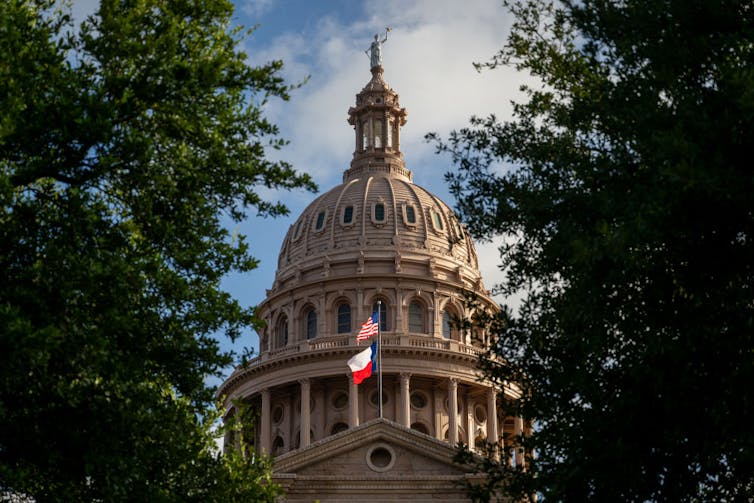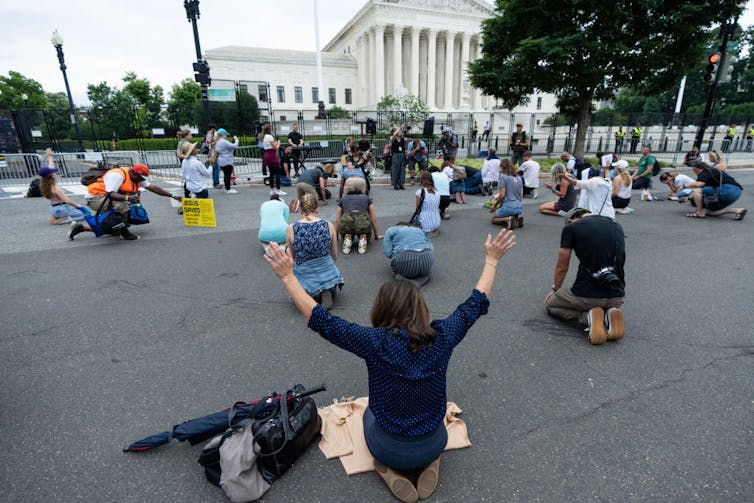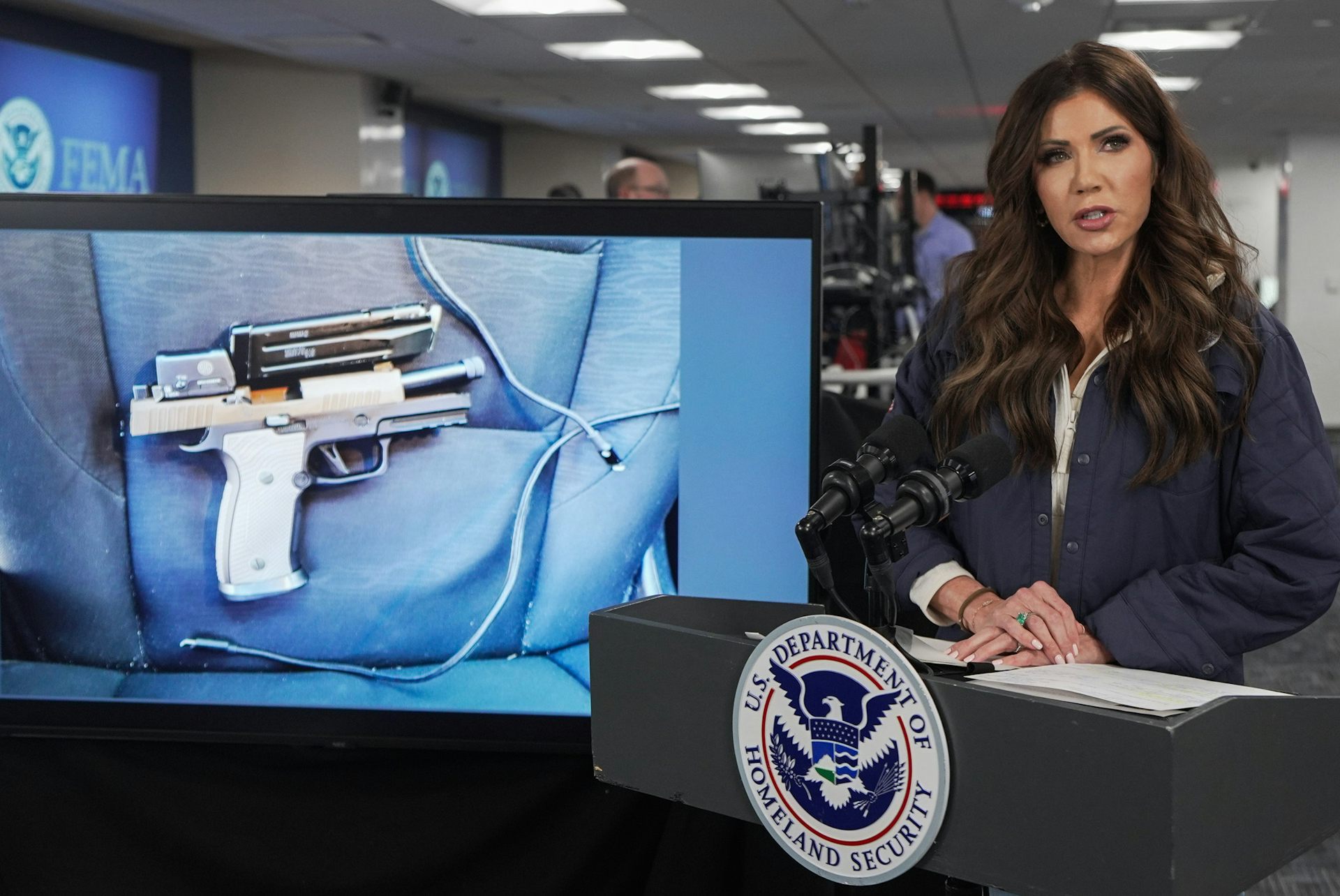Public schools and faith-based chaplains: Texas’ new combination is testing the First Amendment
Recent Supreme Court decisions have signaled a shift in how the country’s highest court interprets the limits on religion in schools.

In 1996, a school board in eastern Texas created a program called Clergy in Schools. Beaumont Independent School District recruited volunteer clergy to counsel K-12 students on topics such as self-esteem, peer pressure and violence. The goal, officials said, was to create volunteer opportunities, encourage conversation about civic values and morality, and enhance safe learning environments.
Clergy in Schools didn’t last long. A federal trial court in Texas invalidated the program in 2002. The judge found that the program violated the First Amendment, according to which, “Congress shall make no law respecting an establishment of religion, or prohibiting the free exercise thereof.” More specifically, the court held that the program was unconstitutional because it was not neutral with regard to faith and conveyed the message that religion is preferable to a lack of religion.
But now, schools across the state are debating whether to open their doors to clergy.
Senate Bill 763, enacted in September 2023, allows school officials to hire unlicensed chaplains, either as staff members or volunteers. Those who can pass background checks will be allowed to perform duties typically provided by counselors, such as mental health support. Local boards have until March 1, 2024, to choose whether to allow chaplain programs in their schools.
SB 763 generates significant questions around the First Amendment. These questions are all the more high stakes given that the Supreme Court has recently signaled shifting views about the limits on religious activity in public schools – themes I teach, write and speak about regularly as a faculty member specializing in education law.
Lone Star State
Across the nation, local boards have difficulty filling counseling positions with qualified staff. In fact, Texas ranks 23rd in the nation in student-to-counselor ratios, with almost 400 students for every counselor.
However, SB 763 was also enacted amid a seeming push to allow religion to occupy a greater place in Texas’ public schools.
One bill requiring officials to display a 16-by-20-inch copy of the Ten Commandments in every public school classroom was passed in the state Senate but died on the floor of the House in May 2023. Another bill, passed by the Senate and sent to a House committee, would allow boards to require schools to provide students with time to pray or read religious texts.

Shifts at SCOTUS
The Supreme Court, too, has displayed a friendlier attitude toward prayer and religion in public education, as reflected in Kennedy v. Bremerton School District: its 2022 decision upholding the right of a Washington state football coach to pray on the field at the end of games.
In so doing, the justices acknowledged that the Supreme Court abandoned the tests it used over the past 50-plus years to assess whether government actions appeared to endorse religion, and therefore whether they violated the establishment clause of the First Amendment.
The most famous of these was often called “the Lemon test,” referring to the court’s 1971 decision in Lemon v. Kurtzman. In order to be permissible, the court ruled in Lemon, an activity involving religion and state had to meet three criteria: that it have a secular legislative purpose; that its principal or primary effect neither advance nor inhibit religion; and that it not result in “excessive entanglement” between religion and the state – though the court did not define “excessive.”
The court also abandoned what was known as the “endorsement test,” which stems from 1984’s Lynch v. Donnelly, in which a man challenged a Rhode Island city over its Christmas display and Nativity scene – and lost. According to the endorsement test, a policy is permissible if a “reasonable observer” would not think it was endorsing or disapproving of religion.
Finally, in 1992, the court abandoned a test it applied only once, in Lee v. Weisman: coercion. The justices invalidated prayer at a public school graduation ceremony on the basis that it coerced people present into listening.
Instead of these tests, the court wrote in 2022’s Kennedy v. Bremerton that “the Establishment Clause must be interpreted by ‘reference to historical practices and understandings.’” However, it remains to be seen exactly what this means.

Crossing the line?
Even so, SB 763 raises at least three thorny issues about how to assess whether a policy violates the First Amendment.
Initially, assuming the lower courts apply the new test enunciated in Kennedy v. Bremerton – that the First Amendment must be interpreted in light of “historical practices” – there do not appear to be traditions supporting the presence of faith-based chaplains as staff members or volunteers in public schools, regardless of whether they were formally credentialed.
Second is the question of endorsing religion. As noted, the Supreme Court repudiated its earlier tests about whether a policy appears to “endorse” a particular religion or no religion, or coerced people into participating. But the fundamental principle still holds: The First Amendment prohibits government from making any law “respecting an establishment of religion.” It thus appears that SB 763 straddles, if not crosses, the line into establishment. Having faith-based chaplains – a move many Texas chaplains themselves oppose – arguably puts the power of the state behind their actions.
Third is the question of which faiths will be represented and whether the chaplain program would appear to endorse some religions over others. Even if SB 763 were to survive a challenge on establishment clause grounds, one must question whether having chaplains from only some faith traditions is wise in an increasingly pluralistic American society, in which the number of people no longer identifying with religion is growing.
Votes ahead
Not surprisingly, SB 763 has its supporters and critics. A board member in one Texas district described the bill as “a great opportunity to bring some spiritual guidance into the schools.” Another supporter, without offering a rationale, suggested that affording religion a greater place in public education could help to make schools safer, including reducing the risk of mass shootings.
Conversely, more than 100 chaplains from various Christian denominations – including the Catholic Church, United Methodist Church and Seventh-day Adventist Church – as well as Jewish and Buddhist leaders signed a public letter opposing the bill. “It is harmful to our public schools and the students and families they serve,” the signatories wrote, because it neither prevents individuals from proselytizing in schools nor insures that they would have the necessary qualifications to serve students.
Boards have begun to vote on whether to allow chaplains in their schools. So far, boards including those in Dallas and San Marcos have chosen not to do so, while others such as Round Rock and Mineola have decided to allow chaplains in their schools.
SB 763 raises serious questions about what crosses the line toward establishing religion that, I believe, will likely result in litigation. Thus, both sides – whether in favor of or opposed to having chaplains in schools – should be mindful of the aphorism to “be careful what you wish for.”
Charles J. Russo does not work for, consult, own shares in or receive funding from any company or organisation that would benefit from this article, and has disclosed no relevant affiliations beyond their academic appointment.
Read These Next
What Olympic athletes see that viewers don’t: Machine-made snow makes ski racing faster and riskier
US Olympic skiers and scientists explain the sharp differences between natural snow and machine-made…
A terrorism label that comes before the facts can turn ‘domestic terrorism’ into a useless designati
A ‘domestic terrorism’ label that comes before the facts teaches the public to treat the term as…
Clarence ‘Taffy’ Abel: A pioneering US Olympic hockey star who hid his Indigenous identity to play i
Despite being a foundational figure in American hockey, Taffy Abel – who hid his Ojibwe heritage so…






